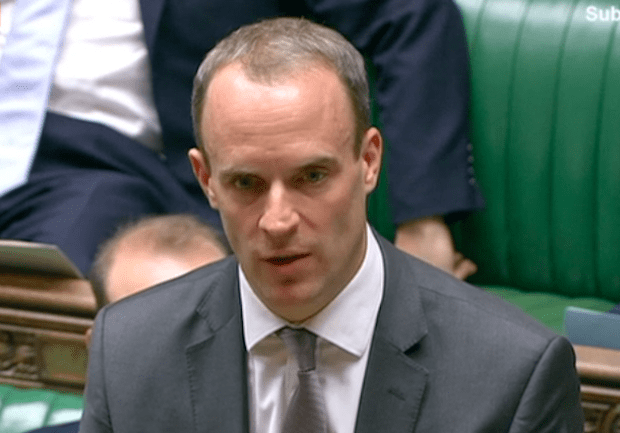When Dominic Raab took up the post of Brexit Secretary in the wake of David Davis’s resignation over Chequers, a number of Tory MPs were surprised by his decision (see Geoffrey Cox for reasons to take Cabinet jobs). Some Brexiteers thought that Raab ought to have proved his Leave credentials and said no given the terms of Theresa May’s soft Brexit blueprint. Others couldn’t work out why the job appealed to an ambitious rising star given that it was by all accounts a hospital pass.
Today’s Brexit statement in the Commons went some way to providing evidence for the latter point. With Theresa May lukewarm on the idea of giving a statement to the Commons on the disastrous Salzburg summit and the state of the negotiations since, Raab was sent out instead. The Brexiteer Cabinet minister put in a valiant effort as he took to the despatch box to insist that the government remained confident that a deal was in sight. He also insisted that the October EU council meeting would be an ‘important milestone’ even though there are current concerns that the Irish backstop is far from being resolved.
Raab successfully batted away criticism by Keir Starmer – the shadow Brexit secretary – by highlighting the inconsistency of the Labour position. This went some way to cheering the divided Tory benches. But when the session went to questions from MPs it all started to go downhill. Frustrated by the state of the negotiations, Brexiteer MPs were in no mood to be helpful. Instead Raab had to deal with a series of hostile questions from his own side – from figures including Bill Cash, Marcus Fysh, Andrew Bridgen and Steve Baker – on everything from the terms of the Brexit lock to the cons of having a backstop on the Irish border to begin with. When Baker asked Raab if he accepted that there are non-backstop solutions to the Irish border problem, Raab curtly replied that the Canada-style Brexit favoured by Tory Brexiters would be ‘a shortcut to no deal’.
However, the most troublesome moment for the UK government came not from the hostile Tory benches – but the DUP. Following rumours that Downing Street could be planning to bounce the DUP into accepting a number of regulatory checks in order to break the Irish border deadlock, Nigel Dodds voiced his concern in the Chamber. The DUP MP said it was ‘rubbish’ to suggest a backstop would be required to avoid the return of a hard border after Brexit and added that he had been dismayed by comments on this both by Brussels and some UK government officials. Dodds took the opportunity to re-iterate his party’s red line of no special treatment for Northern Ireland to the rest of the United Kingdom – warning Raab that his government should learn their lesson from December when they tried to bounce the DUP into an agreement and failed. The fact that Dodds felt the need to go public with his concerns shows the level of mistrust between the two parties – which share a confidence and supply agreement. With the next fortnight crucial to the government’s deal, it’s hardly an encouraging sign of the state of play.







Comments